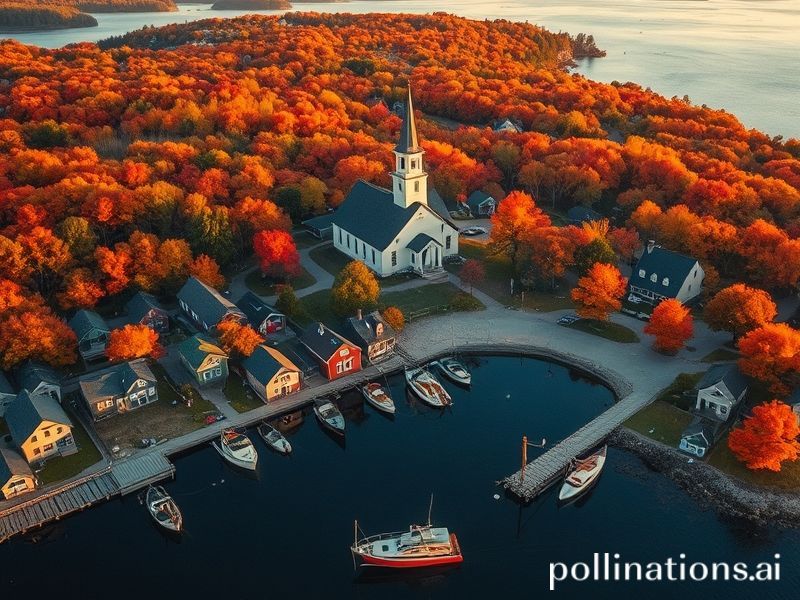New England: The World’s Boutique Apocalypse, Now Available in Maple-Scented Hypocrisy
New England, the six-state corner of the United States that once fancied itself the moral cockpit of the Western world, has spent the last 400 years oscillating between revolutionary zeal and artisanal smugness. From a safe remove—say, a café terrace in Lisbon where the espresso still costs less than a Boston parking ticket—its latest incarnation looks less like the cradle of American democracy and more like a boutique theme park for Ivy-educated masochists who enjoy paying triple for firewood that smells of liberal guilt.
Globally, the region matters precisely because it insists it doesn’t. While Washington bellows and Silicon Valley monetizes your nightmares, New England exports a quieter, deadlier product: the notion that virtue can be curated. Take its climate agenda. Vermont’s ski slopes now open later each year, a fact dutifully mourned in The New York Times style section while the Global South measures sea-level rise in lost villages. The same Vermont that sanctimoniously banned fracking happily heats 40 percent of its homes with fuel oil—imported, of course, from countries that can’t afford Vermont’s scruples.
Across the Atlantic, European capitals watch New England’s “Green New Deal” branding the way one watches a reformed chain-smoker vape: intrigued, skeptical, and slightly worried about second-hand sanctimony. Germany’s energy minister, juggling Russian gas withdrawal and French nuclear side-eye, recently quipped at Davos that “at least we’re not pretending maple syrup is a strategic reserve.” The line drew nervous laughter from the audience of consultants who bill by the carbon offset.
The region’s tech sector, meanwhile, has perfected the art of weaponized nostalgia. Cambridge startups now sell AI-powered lobster traps—because nothing says “disruption” quite like digitizing crustacean genocide. Investors from Singapore to Dubai line up, eager to park capital in something that feels both quaint and inevitable. The irony, lost on no one outside Route 128, is that the lobster itself is migrating north to escape the very waters these apps claim to monitor.
Culturally, New England functions as the West’s finishing school for doom. Its universities mint the analysts who later explain, in impeccable prose, why the world is ending faster than a Red Sox bullpen in September. A Bangkok newspaper recently ran a cartoon depicting Lady Liberty wearing a Patagonia fleece, holding a scalding Dunkin’ iced coffee, and lecturing a drowning planet on pronouns. The caption read: “Thoughts and prayers, but make it Ivy League.”
Yet for all the mockery, the region still exports a stubborn template: the belief that small, cold places can punch above their weight by weaponizing education and moral superiority. From Seoul to Stockholm, policymakers study Massachusetts’ healthcare experiment the way medieval princes once studied Venetian banking: with admiration, envy, and the quiet certainty they’ll do it cheaper. When Rwanda announced its plan to become the “Singapore of Africa,” consultants arrived bearing Boston’s playbook—minus the snow-shoveling metaphors.
Even the politics have gone global. The recent election of a millennial governor whose campaign slogan was literally “wicked decent” prompted think pieces in London comparing him to a “Keir Starmer who knows how to skate on a cranberry bog.” Meanwhile, Chinese social media influencers film autumn foliage pilgrimages to Vermont, hashtagging #SmallTownCore and marveling at a place where no one live-streams their food unless it’s a $14 heritage beet.
In the end, New England survives because it is the world’s permissible hypocrisy: a region that lectures on carbon while heating with oil, celebrates immigration while pricing out its own workers, and sells revolution by the scented candle. The rest of us watch, half-horrified, half-envious, like diners at a tapas bar eyeing the table that ordered the entire menu and left before the bill arrived. And perhaps that is its true international significance: proof that you can still thrive by being beautifully, unapologetically inconsistent—as long as you brand the contradiction as charm.







